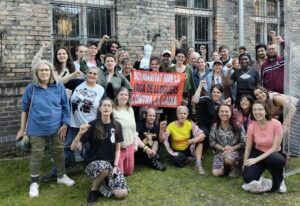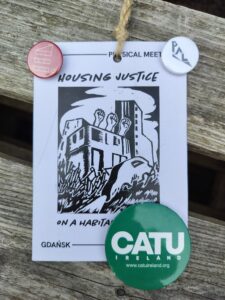Author: Steph Collins
Steph Collins is a member of the CATU Kildare Branch and has been an active member of the union for a number of years. They are interested first and foremost in organising communities while maintaining a keen interest in analysing the housing system and the housing movement and translating that into stories. Among other things, they write articles about housing narratives which can be found at narrativedwellings.substack.com
What’s Next for the Housing Movement: Towards an International Rent Strike!
Wednesday, June 25th. It’s three o’clock in the morning. I’m making the long walk down the canal and past the train station. It is quiet at this hour, trains don’t start running until 6, a fact for which I am regretful. There aren’t many people awake at this hour. Some night workers, taxi drivers ferrying home the late crowd from the pub, then there’s myself and three others, standing waiting patiently for the 23 bus. I feel slightly stressed in this moment. I know this bus is the only one that will get me to the airport in time, I know I’m already cutting it fine with time, that if this bus is late it will eat in to my state mandated (not really) ‘arrive two hours in advance of your flight to make sure you get to your gate’ time. This thought doesn’t have a chance to fully form before the bus presents itself exactly five minutes after it was scheduled, which, in fact, can probably be considered early.
That morning I was on my way to the airport to embark on the first of two flights. Leg one: Dublin – Manchester. Two hours rest in Manchester, have a coffee, maybe some breakfast, if prepared to plunge my account into overdraft. Leg two: Manchester – Gdańsk, the final destination, at least for the next 5 days. This is because between the 25th and the 30th of June, members of the European Action Coalition for the Right to Housing and the City met in Gdańsk, Poland for one of their bi-annual conferences. These general assemblies involve a wide range of internal plenary meetings, workshops and skill shares to enable militant groups from across Europe to share learnings and coordinate actions against common antagonists. Seventeen of the thirty-one member organisations were represented in person at the conference producing 51 participants from France, Spain, Catalonia, Serbia, Portugal, Netherlands, Germany, Greece, Czech Republic, UK, Poland, Italy, Hungary and, of course, Ireland.

The coalition has emerged over the last ten years as a vehicle for grass roots groups to coordinate common campaigns. As the European Union has further adjusted its policies towards a neo-liberal model of market self-regulation, multi-national investment funds have swept across Europe leaving in their wake a trail of evictions and decimated communities. Many of these funds operate across political jurisdictions. So, while as tenants’ unions our actions are local and our organisation happens street by street, block by block, we must strategise internationally to build power against these funds whose political influence are ever increasing.
Think globally, act locally has long been a slogan embraced by the climate movement. This slogan also perfectly represents the goals of the EAC, grass roots movements co-ordinating local actions against global antagonists. The main campaign of the coalition over the last number of years has been the coordination of international Housing Action Days. These actions usually take place at the start of April with member organisations encouraged to organise local displays of action on or around the same day. One of the first discussions that was had during the meeting was a reflection on this year’s Housing Action Day which marked the 5th year of the campaign. There was strong input from the Sindicat de Llogitares (Catalonia) and the Sindicato de Inquilinas (Madrid) championing a more cohesive strategy for these housing action days. The actions that fall under the Housing Action Day campaign have tended to be general and symbolic. There was general consensus on the need to be more strategic with our actions by picking specific direct targets. For example, one of the largest vulture funds operating in Spain is headquartered in the Netherlands. Through the network of the European action coalition the Spanish and Catalan unions began coordinating with the Bond Precaire Woonvormen (Netherlands) for a potential international direct action.
The conference also created a space to carry out further international solidarity actions. The representative from the Berlin Tenants’ Union invited the EAC delegates to take a postcard prepared by their union addressed to a landlord with whom they have an ongoing dispute. Members were encouraged to send these postcards from their home country to put international pressure on these international investors. If the funds can operate across borders, so must we!

The theme of the meeting in Gdańsk was specifically “Housing Justice on a Habitable Planet”. The EAC recently received a tranche of climate action funding to explore the links between the housing movement and the climate movement. A number of internal plenaries were facilitated during which guest delegates from climate action organisations shared their skills and experiences enabling us together to develop an understanding of the solidarities and the tensions between the two movements. What emerged was four key areas of overlap:
- Energy poverty. Tenants and renters often live in some of the most energy inefficient homes. Without access to structural energy upgrades that private homeowners have access to, as the climate crisis worsens and as our summers get hotter and winters get colder, this is going to become an issue that we can collectively agitate on.
- Construction. Concrete production alone is responsible for almost 10% of global carbon emissions and this doesn’t even take into account the transport of materials, secondary manufacturing and of course all of the other industries and site works that result in a finished building. It is widely accepted that the most climate friendly building is the one that already exists. States that reinforce the myth of housing shortage in order to fuel a construction industry are not just stoking property prices but the climate crisis as well. In Ireland, hundreds of thousands of homes lie empty as they are treated as investment assets. Requisitioning these homes, based on numbers alone, would be enough to end homelessness on this island entirely. Obviously, as the population grows there will be a need for strategic developments of new buildings, however tackling the crisis of ownership will have a positive impact on both the housing crisis and the climate crisis.
- Transport. Transport is responsible for about 25% of all carbon emissions globally. The most carbon intensive forms of transport are air travel and private car travel. Rising rents in the cities push workers to farther reaches of the commuter belt which are often poorly served by public transport. Wealthier areas of our cities are often served by the best transport links. In Dublin property prices jump by a quarter depending on how near they are to DART and Luas links. Developing a more reliable and broad reaching transport network is key for tackling the climate crisis and may be important for the housing crisis too, but we must be prepared to strategically resist the gentrifying force of public transport fuelled property speculation.
- Tourism and hyper mobility. The tourism sector has seen its biggest growth in the last 20 years. Contrary to the popular idea that tourism brings money into an economy, it is in fact an extractive industry. Cheap air travel leaves in its wake untold pollution. Cheap rental cars incourage an increase in car journeys, adding to the pollution of our towns, cities and natural environments. The rise of short term tourism rentals has exacerbated the wave of evictions across Europe, decimating our communities. The tourism economy is a shared front that is being fought individually by both climate and housing activists. There is a clear space for strategic unity here.
With the realisation of our shared antagonisms, the question we are left with is what forms of agitation can be employ in order to achieve our shared goals? At the previous meeting of the EAC in Barcelona last November, delegates voted in support of adopting a strategy of working towards an internationally coordinated rent strike over the next ten years. Another focus for this meeting was fleshing out what exactly this will look like for different organisations. Although a lot of the EAC member organisations are tenants’ unions, there are also a number of broad campaign groups as well as notably the PAH in Spain who work with people affected by mortgage foreclosures in the wake of the 2008 global financial crisis. Moreover, all of the tenants’ unions in the coalition are at vastly different stages of development both in terms of membership and in terms of local power building. For some, working towards a rent strike will be no issue; The Sindicats in Spain and Catalonia are already at this stage, having organised tenants to withhold rent in an ongoing dispute against two of the largest vulture fund landlords operating in Spain: Néstar-Azora and La Caixa. Bond Precaire Woonvormen recently had a rent strike win and are actively organising tenants to resist extortionate rent increases promoted by the Dutch government. Rent strikes could be a valid tactic employed to achieve climate goals, particularly in relation to energy poverty and efficiency as this overlaps with our age old enemies of damp and mould (cultivated, of course, by neglectful landlords).

Given the fact that CATU is among the more developed tenants’ unions within the coalition, we are in a strong position to work towards the realisation of rent strikes. Our recent all island mobilisation saw thousands of tenants and supporters out on the streets demanding housing justice now. The government of the 26 counties recently made the decision to dramatically change how rent controls work which has left hundreds of thousands of tenants in dire uncertainty. The refusal to control rents is leaving tenants little option but to work towards controlling them ourselves, by any means necessary. As support for the union grows, withholding rent, resisting increases, going on rent strike are becoming increasingly viable tactics. We’ve seen it work in the past on this island and we are currently seeing it work in our present across Europe. We simply must clarify our demands, and believe in them whole heartedly.
In our fight against landlordism on this island, there will come a point when rents will no longer be paid. This is not a question of if but when. The all-island mobilisation on July 5th revealed our broad network of support deeply rooted in our communities. We have a duty to our international comrades to prove the feasibility of this tactic. After five years of organising, we have built an infrastructure of support that has mobilised on innumerable cases to defend our members and defend our communities. We are approaching a point where we must switch from defence to attack. We can afford to antagonise the landlords. The international funds have no right to our wages. Tenants will be victorious in our fight for housing justice both on this island and abroad. United as one, we cannot be evicted!
I must extend my gratitude to the staff team at the EAC for all of the work that went into organising the extended meeting. And equally a huge thanks to the host group Pomorska Akcja Lokatorska (Pomeranian Tenant Action), a fledgling tenants union with only a small number of members – on behalf of CATU we wish you a bright and organised future. Victory to the tenants in Europe and Across the globe!


